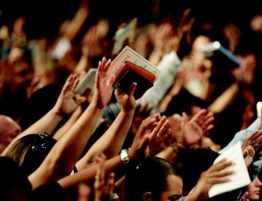
Most Christians would readily agree that in some way or another, physical healing is included as part of Jesus’ atonement. If it is not received in this life, definitely it will be in the next one. But the real question that causes division is, “Does the atonement of Jesus guarantee physical healing in this life?” When put this way, even the most diehard Pentecostal would admit to the contrary.
This article investigates if Jesus’ atonement guarantees physical healing in this life.
Main Points
-
- Isaiah 53:5 can refer to physical or spiritual healing.
- Healing is possible through the gifts of the Spirit, but not guaranteed.
- Perfect health in this life is unlikely because we live in corruptible bodies.
- Perfect health is guaranteed in the next life.
DOWNLOAD FREE CHAPTERS FROM OUR NEW BOOKS
Most Pentecostals believe that physical healing is provided in the atonement, but not all. Renowned Pentecostal Bible scholar Gordon Fee does not hold to this view yet is very convinced that the gifts of the Spirit are still for the church today. It is possible to be Pentecostal without believing in faith healing. It is possible to believe in the gift of healing without believing in atonement healing. God may and can still heal through the gifts of healing or through prayer, even if he did not provide healing through the atonement.
What’s the difference? Well if healing is provided in the atonement (the same way salvation is), then healing should be GUARANTEED in this life. But if healing in this life is only provided through prayer and the gifts of the Spirit, then it is POSSIBLE but not guaranteed.
Main scriptures
There are basically 2 verses of scripture that are used to support the belief that healing is provided in the atonement – Isa. 53:4 & 5.
Isa 53
4. Surely He has borne our griefs and carried our sorrows: Yet we esteemed Him stricken, smitten by God, and afflicted.
5. But he was wounded for our transgressions, he was bruised for our iniquities; the chastisement for our peace was upon Him, and by his stripes we are healed.Matthew 8:17
that it might be fulfilled which was spoken by Isaiah the prophet, saying: “He Himself took our infirmities And bore our sicknesses.”
When was this scripture fulfilled?
Parts of Isa. 53 refer to the atonement and parts do not. Verse 4 was quoted in Matt. 8:17 during Jesus’ earthly ministry. That scripture was fulfilled when Jesus was on earth healing the sick, not when he was on the cross dying.
Verse 5 definitely refers to the atonement. But does it refer to physical healing or spiritual healing?
1 Peter 2:24
who Himself bore our sins in His own body on the tree, that we, having died to sins, might live for righteousness—by whose stripes you were healed.
Peter quoted Isaiah 53:5 in the context of spiritual healing. Peter was discussing the subject of retaliation. Jesus was reviled yet did not retaliate, and he is our example to follow. He then quoted Isa. 53:5 to support his position. He certainly was not referring to physical healing, but rather deliverance from the tendency to retaliate.
At the same time, the Hebrew word rapha often referred to physical healing. Thus Isa. 53:5 could refer to physical or spiritual healing.
Does salvation guarantee physical healing?
Some claim that the word salvation (Gr. soso) carries the idea of total deliverance from sin and sickness. Perhaps the Greek word could mean all these things, however it is unlikely that every single meaning of a word will be implied every time it is used. This is called word loading. The context is supposed to determine the meaning. If I said,
“I have my groceries in my trunk”
This does not mean that I have my groceries in my elephant, in my tree, and in my small suitcase all at the same time. Clearly a car trunk is the correct meaning as is clear from the context. Similarly when the Bible speaks of our salvation, it most often speaks of our deliverance from sin and the curse of the law, not from all sickness and disease and poverty.
But even if it did …
Let’s pretend for a minute that physical healing was provided in the atonement the same way salvation was. Let’s see how that will play out.
Isaiah 53 teaches that Jesus died to provide forgiveness and cleansing for our sins and infirmities. But after we are forgiven, we still often sin. Even if healing were provided in exactly the same way, doesn’t that imply that even we are saved, Christians can still suffer with sickness?
So even if healing is provided in the atonement, it does not guarantee perfect health.
Perfect health is highly unlikely in this life
1 Corinthians 15
42 So also is the resurrection of the dead. The body is sown in corruption, it is raised in incorruption.
43 It is sown in dishonor, it is raised in glory. It is sown in weakness, it is raised in power.
1 Cor. 15:42, 43 tell us that our natural body was sown in corruption and dishonor, but will be raised up incorruptible and in power. Right now it is subject to weakness and sickness, but after the resurrection, it will experience perfect health. But this is not guaranteed until then.
Perfect health is guaranteed in the next life
I do not believe physical healing is provided in the atonement in the same way salvation is provided. However, all who are saved will achieve perfect health in the next life. Healing is available through the gifts of the Spirit and the prayers of righteous men and women, but not guaranteed. Salvation is guaranteed for all who (genuinely) believe and thus it works every time without fail. People who believe are not always healed. Some are, some are not.
Conclusion
In the event that believers get sick, it is perfectly in order to pray for healing and to call for the elders. However faith does not imply that one should dispense with medical help. If the Bible says that a merry heart does good like medicine (Proverbs 17:22), doesn’t it imply that medicine is good? I believe that the majority of sicknesses today are caused by natural means – poor diet or unhealthy lifestyle choices. Christians would be well advised to take care of themselves physically. This would involve getting sufficient rest, eating well rounded diets, and physical exercise. Prevention is always better than cure.






